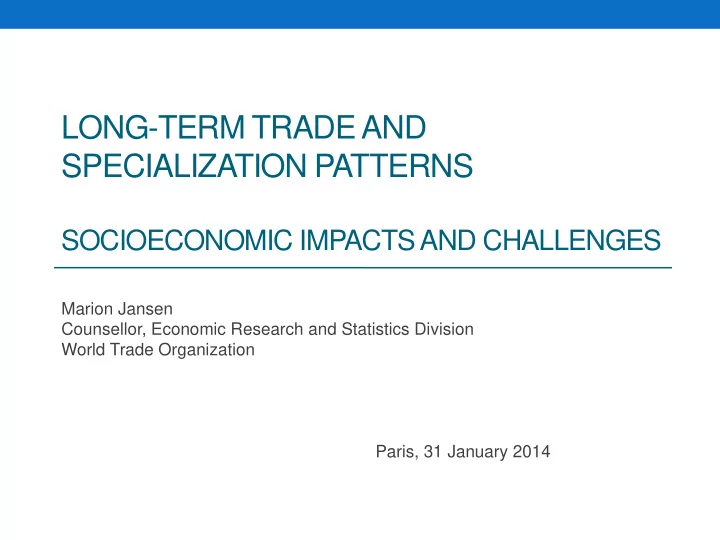

LONG-TERM TRADE AND SPECIALIZATION PATTERNS SOCIOECONOMIC IMPACTS AND CHALLENGES Marion Jansen Counsellor, Economic Research and Statistics Division World Trade Organization Paris, 31 January 2014
World Trade Report 2013 Factors shaping the future of world trade
Long-term trade and specialization patterns: Socioeconomic impacts and challenges What if globalization and growth go hand in hand with increased inequality? How to ensure flexibility when people care about stability? How to compete when education levels rise around the globe
4 What if globalization and growth go hand in hand with increased inequality? In 16 developed economies, the average labour share dropped from 75 % of Technologi national income in the mid-1970s to 65 % cal change in the years just before the economic crisis (ILO, 2013). FDI trade Labour share of Financiali- GDP zation Which measure of inequality to use: Labour market High skilled versus low skilled wages (OECD study) institutions Labour share of GDP (ILO) Evolution of top incomes (e.g. Alvaredo, Atkinson, Piketty, Saez)
How to ensure flexibility when people care about stability? Labour market flexibility (weaker employment Job Insecurity (worries about personal working situation ) and its protection?) is good for growth. correlation to attitudes toward globalization and trade (OECD study) BUT Fear about job loss (individuals) is correlated with negative attitudes towards globalization in Asia and Europe Source WTR 2013 (Correlations computed using Asia Europe Survey (2001). Minimum significance: 10%).
6 Competing when education levels rise across the globe Where will R&D be conducted? Where will patents be held? Which companies/countries will be able to capture mark-ups? U.S. China India Japan E.C. India U.S. Russian Fed China Pakistan E.C. Philippines 2010 Russian Fed 2050 Fouré, Bénassy-Quéré and Fontagné (2012).
Competing when education levels rise across the globe Public-private partnerships/collaborations are necessary to create skills for competitiveness (ILO-WTO event (July 2013) with contributions from the ILO, OECD, World Bank and the WTO). SKILLS FOR The public sector needs the COMPETITIVENESS private sector to know which skills are needed: The private sector needs the public sector in order to generate those skills.
Long-term trade and specialization patterns: Socioeconomic impacts and challenges • This will be a world of constant change • Socio-economic challenges will remain significant • Policy decisions will affect public support for globalization • Well-designed skills policies will be a fundamental element of the right policy mix
Recommend
More recommend